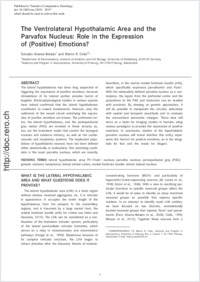The ventrolateral hypothalamic area and the parvafox nucleus: Role in the expression of (positive) emotions?
- Alvarez-Bolado, Gonzalo Department of Neuroanatomy, Institute of Anatomy and Cell Biology, University of Heidelberg, Germany
- Celio, Marco R. Anatomy and Program in Neuroscience, University of Fribourg, Switzerland
-
01.08.2015
Published in:
- Journal of Comparative Neurology. - 2016, vol. 524, no. 8, p. 1616-1623
lateral hypothalamic area
PV1 Foxb1 nucleus
parvafox nucleus
periaqueductal gray PAG
gelastic seizures
hamartoma
lateral orbital cortex
medial forebrain bundle
lateral tuberal nucleus
English
The lateral hypothalamus has been long suspected of triggering the expression of positive emotions, because stimulations of its tuberal portion provoke bursts of laughter. Electrophysiological studies in various species have indeed confirmed that the lateral hypothalamus contributes to reward mechanisms. However, only the rudiments of the neural circuit underlying the expression of positive emotions are known. The prefrontal cortex, the lateral hypothalamus, and the periaqueductal gray matter (PAG) are involved in these circuits; so, too, are the brainstem nuclei that control the laryngeal muscles and subserve mimicry, as well as the cardiovascular and respiratory systems. The implicated populations of hypothalamic neurons have not been defined either anatomically or molecularly. One promising candidate is the novel parvafox nucleus, which we recently described, in the murine medial forebrain bundle (mfb), which specifically expresses parvalbumin and Foxb1. With the molecularly defined parvafox nucleus as a centerpiece, the inputs from the prefrontal cortex and the projections to the PAG and brainstem can be studied with precision. By drawing on genetic approaches, it will be possible to manipulate the circuitry selectively with spatial and temporal exactitude and to evaluate the concomitant autonomic changes. These data will serve as a basis for imaging studies in humans using various paradigms to provoke the expression of positive emotions. In conclusion, studies of the hypothalamic parvafox nucleus will reveal whether this entity represents the fulcrum for positive emotions, as is the amygdala for fear and the insula for disgust.
- Faculty
- Faculté des sciences et de médecine
- Department
- Département de Médecine
- Language
-
- English
- Classification
- Biological sciences
- License
-
License undefined
- Identifiers
-
- RERO DOC 257257
- DOI 10.1002/cne.23853
- Persistent URL
- https://folia.unifr.ch/unifr/documents/304520
Statistics
Document views: 99
File downloads:
- pdf: 360
